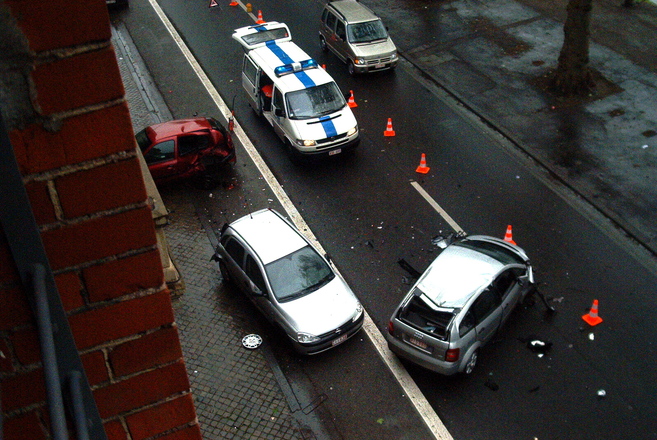Although a car accident lasts no more than a few seconds, that small fragment of time is overflowing with chaos. As loud as the impact sounds outside to witnesses, to the people in the car, in the very vortex of the crash, the noise can be piercing and frightening. Sometimes you hear the crash before you feel yourself being thrown forward with the force of a hurricane and sucked back into your seat by the strength of your seat belt. If you’re lucky, the accident is merely a fender-bender and is over almost as soon as it starts.
If it’s a small accident and no one is seriously injured, the relief alone can sometimes make us overlook small signs in our body that something is wrong. We tend to miss the subtle symptoms if there are no broken bones or blood, especially in small accidents where paramedics aren’t involved. If you start to notice these four symptoms, in the hours and days and weeks following your accident, it’s possible you’ve sustained car accident injuries.

#1: Neck Pain & Stiffness
This may be a sign of whiplash. Whiplash is a common car accident injury, as it occurs when your head moves forward and backward forcefully and/or quickly. During whiplash, your ligaments, discs, or muscles in your neck are damaged (for more information about whiplash, click here.) Your car’s airbags play a major role in the prevention or mitigation of major whiplash, but injury can still occur, especially if your car is an older model and is not equipped with this safety feature. Other associated symptoms of whiplash include:
- Headache
- Pain in lower back, back of neck, and in-between the shoulder blades
- Numbness in arms and hands
- Difficulty sleeping and concentrating
Whiplash can be difficult to diagnose as the symptoms can show up days after the car accident and are only detectable in an MRI. If you’re experiencing these symptoms, it is important to see your doctor.
#2: Headache Accompanied by Confusion
This could be a concussion. Although you may walk away from an accident feeling fine, much like whiplash, the symptoms of a concussion can show up hours and days afterwards and can get worse. The symptoms are also common to whiplash, such as difficulty sleeping and concentrating, but also include:
- ●Change in mood
- ●Nausea, dizziness, vomiting
- ●Trouble seeing, blurry vision
For more information about the symptoms and treatment of a concussion, click here. If your pupils are different sizes and your symptoms are getting worse, the Centers for Disease Control and Prevention recommends that you see a doctor right away. If you hit your head in a car accident, and these symptoms appear, don’t take the situation lightly.
#3: Abdominal Pain
If you’re experiencing abdominal pain, this could be a symptom of internal bleeding in the kidneys, spleen, liver, or other organs, which is usually quite severe. Not all car accident injuries happen to the people in the car. According to an article in the Globe and Mail, pedestrian deaths have increased by fifteen percent in five years, which means that a Toronto pedestrian dies every ten days from a car accident injury. If you’re in the car during an accident, and you’re wearing your seatbelt properly, the chances of exposing your internal organs to trauma is a lot less likely than a pedestrian getting struck by a car. Of course, in a major car accident, major trauma can happen to anyone involved.
Other symptoms of internal bleeding include:
- Swelling and tenderness near the affected area
- Dizziness, drowsiness
- Nausea, vomiting (blood may be present)
- Fever
If you’re experiencing abdominal pain, chances are something struck you during the car accident, in which case, you might not have a hard time remembering what happened to cause the pain. If you do remember being struck by something, take yourself to the hospital immediately.
#4: Anxiety & Depression
This may be a sign of Post-Traumatic Stress Disorder or PTSD. While not a physical injury, PTSD can manifest into aches and pains and causes a great deal of stress, which also comes with a lot of physical symptoms. It should be taken seriously, and if you think your symptoms are a sign of PTSD, see a doctor who can recommend psychological treatment. PTSD is caused by a traumatic event that threatens your life, such as a car accident.
Other symptoms of PTSD include:
- Repeatedly reliving the event (either awake or as a nightmare)
- Avoiding people, places, and things that bring back memories of the event
- Anxiety and Emotional Reactivity
- Emotional Detachment
Post-Traumatic Stress Disorder can last decades if left untreated. Not only does it affect your health and well-being, but your changed behaviour and emotional detachment can affect your relationships.

What to do After Your Car Accident Injuries Have Been Treated
Being involved in a car accident is traumatizing enough. Even small fender-benders can cause us a certain level of stress and anxiety. It’s rare that we can simply walk away from an accident without it costing our time, money, and health. Some medical conditions, such as whiplash or a concussion, are more easily fixed than others. In more serious accidents, where blunt-force trauma, dismemberment, or even the death of a loved one occurs, it’s much harder to bounce back. If you’ve been seriously injured in a car accident and you live in the Greater Toronto Area, contact a Toronto personal injury lawyer at Sokoloff Lawyers. You may be eligible for compensation.
Please note: this list is not intended to replace professional medical advice and is for informational purposes only. If you’re injured in a car accident, please refer to your doctor’s advice.
Sources: